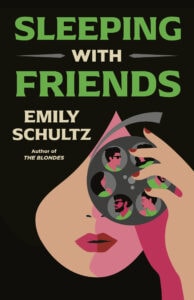The Life Changing Magic of Researching Just Enough
by Emily Schultz
In a classic scene from The Birdcage, Robin Williams tries to educate a not-so-bright dancer on 100 years of choreography in one minute. After Williams’s volley of examples, the punchline is a dead stop at the directing cliche, “But keep it all inside.”
Research that fiction writers do can seem like that as well. While it’s true some writers live for realistic details and knowledge, more often than not the research is something that you ultimately forget about.
You can pile books on your desk for many reasons: reminders to do the writing or even as good luck charms.
For fiction, I found the best research is stumbling on an image.
My newest novel, Sleeping with Friends, is about a woman whose coma has damaged her real-life memories yet left her with plenty of movie images intact. I didn’t feel I needed to go back and review old films. I’ve seen plenty and although they’re sometimes fragmented in my mind, the idea was to hit the essence. An online image of Duckie in Pretty in Pink saved to my desktop gave me the character of Ethan. Mia is surrounded by her old friends from college, but can’t always remember their names. Ethan is now “Duckie” and her best friend, Agnes, is Thora Birch in Ghost World.
For my novel, The Blondes, a story of a virus that burns around the world affecting only blonde woman, the inspiration was a single ad in Vanity Fair of a malicious looking group of blondes.
To be sure, you have to be correct about real world facts. Readers, especially in genres like sci-fi or procedural crime, will notice flubs and are not shy about pointing them out.
As a writer whose primary concern is character, my process is to get the story down first and fact-check later. If you don’t, the facts can become the story, and a rather dull story at that. What you want to get alive on the page is the reactions and motivations—what bonds this group of people, why have they each done what they have, and what is each hiding—with the facts supporting those.
For something like the court scene in my literary thriller, Little Threats, I needed the emotions in place before anything else. I mean, no one, and absolutely no one, is excited by writing the “court scene” at this point. So, I chose to focus on the characters—a group of teenagers in the galley—who’ve just discovered Kurt Cobain died and then bring the trial to a stop with their out-of-control emotions. By using this distraction and getting into the mood of the devastated youth, I really don’t need to highlight for the reader the nuances of plea deals and sentencing guidelines. Legal procedures can always be corrected, but doing too much research can kill the mood before you even start. Again, this isn’t a call to be sloppy.
Did I confirm what time the news of Cobain’s death would have hit the East Coast? Yes. Did it matter in the end? No.
As a writing prompt, get away from the idea of a stack of books on your desk for fiction research. You’re writing a story, not collecting references for a thesis.
Your takeaway exercise is to come up with a visual to keep on your desktop or taped on the wall or your workspace—something that feels specific to the world you’re building. If you think you’re less visually inclined, then make a Spotify playlist for your character. Settle on the character’s birth year and use that as your guide. Which song did they dance to at age 10? Which song did they put on after being fired for the first time?
Then, keep it all inside.
HANK PHILLIPPI RYAN: Wow. This is spectacular advice. How about you, Career Authors? What’s your key to research? Let’s talk about it on the Career Authors Facebook page.
 Emily Schultz is the author of Sleeping With Friends and the forthcoming Brooklyn Kills Me, both from Thomas & Mercer. She is the co-founder of Joyland
Emily Schultz is the author of Sleeping With Friends and the forthcoming Brooklyn Kills Me, both from Thomas & Mercer. She is the co-founder of Joyland  Magazine. Her last novel, Little Threats, was published by GP Putnam’s Sons and was named an Apple Books Best of 2020 pick. Her novel, The Blondes, released in the U.S. with St. Martin’s Press and Picador, in France with Editions Asphalte, and in Canada with Doubleday. It was named a Best Book of 2015 by NPR and Kirkus. The Blondes was produced as a scripted podcast starring Madeline Zima (Twin Peaks), and created by Schultz and Brian J Davis. Translated into French, German, and Spanish it had over one million listeners worldwide.
Magazine. Her last novel, Little Threats, was published by GP Putnam’s Sons and was named an Apple Books Best of 2020 pick. Her novel, The Blondes, released in the U.S. with St. Martin’s Press and Picador, in France with Editions Asphalte, and in Canada with Doubleday. It was named a Best Book of 2015 by NPR and Kirkus. The Blondes was produced as a scripted podcast starring Madeline Zima (Twin Peaks), and created by Schultz and Brian J Davis. Translated into French, German, and Spanish it had over one million listeners worldwide.
Her writing has appeared in Elle, Slate, Evergreen Review, Vice, Today’s Parent, Hazlitt, The Hopkins Review, and Prairie Schooner. She lives in Brooklyn where she is a producer with the indie media company Heroic Collective.





